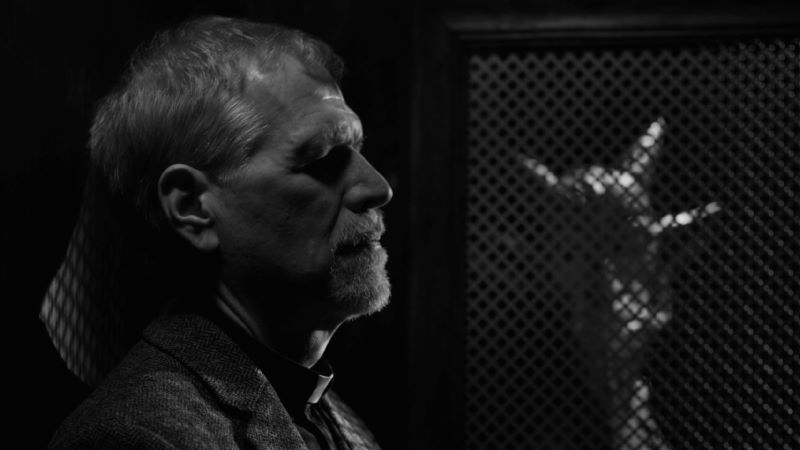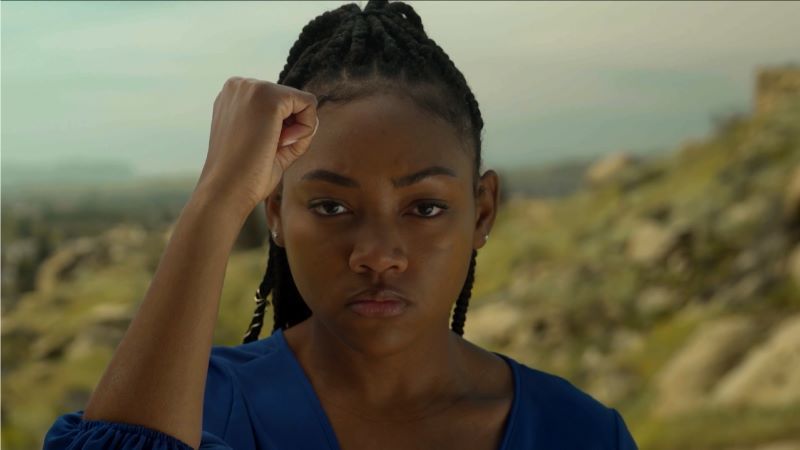Don't Close Your Eyes
Review of the "Powerful Grit" screening at NFFTY.
Written by TeenTix Newsroom Writer Ava Rudensey and edited by Teen Editor Olivia Sun.

I walked into the theater ever so slightly confused. After skimming through the NFFTY (National Film Festival for Talented Youth) catalog of hundreds of films, I wondered: what was tonight’s screening, “Powerful Grit,” actually going to be about? As the lights dimmed, I prepared to “buckle [my] eyebelts” as the show description advised. Whatever that meant. However, after watching the screening, I can now define the phrase with confidence: It’s the feeling of peeking out from underneath a blanket when the monster in a horror movie finally emerges; it’s the anxiety one gets when a roller coaster delays right before it plummets; and it’s that combination of excitement and dread that I imagine occurs during the plane ride up to go skydiving.
The screening began with Baby by Vincent D’Alessandro, Kirsten Pasewaldt, and Finley King. It is the story of a single mother, her expectations, and eventual revolt alongside her young, tiara-crowned daughter Baby. Though it has a relatively simple story-line compared to subsequent films in the screening, what stands out is the film’s immersive first-person shots—when Baby runs, the camera follows. When she falls, we fall too. This left a lingering sense of intimacy before being thrown headfirst into the vulnerable and melancholic world of You’re Still Here by Katayoun Parmar.
This film tells the story of a young couple whose lives are torn asunder when tragedy strikes. However, as the film goes on, it is revealed that even before the man’s life-changing car accident, their relationship was far from ideal. Graphic, punchy shots of violent fights are mixed in with scenes that wouldn’t seem out of place in a rom-com. I was left questioning who the audience was supposed to root for. Just as the protagonist’s soon-to-be-ex-wife felt, I was unsure if their relationship was even worth all of the struggles the couple faced. I sympathized with the husband due to his accident, but I failed to connect with him because of his cruelty.

Next was the Twilight-Zone-esque The Confession by Nathan Ginter. This film is almost entirely in black and white, giving it an old-fashioned feel. It asks what might happen if a devil-like figure confessed their sins. This film was sufficiently scary thanks to a fantastic soundtrack of terrifying, high-pitched music, as well as the costuming, with masks resembling Satan. The most chilling aspect, however, was the clever commentary on some of the less savory secrets of the Catholic Church: even the priest seemed like he had something to confess. Though The Confession most closely resembles a typical horror movie, it also has one of the most profound messages: forgiveness must come from not only the heavens, but also from those one has wronged.
As the night went on, five more films were shown, taking us from drug addiction to a not so heavenly Garden of Eden. Two films, Wildflower by Jumai Yusuf and Alexander Atienza and What Daphne Saw by Lizz Marshall, stood out amongst them. Despite being set in completely different dystopias, they both have the idea of a young woman's perseverance against prejudice at their core. Additionally, both plots utilize technology as a weapon. In Wildflower, it’s an app responsible for ethnic cleansing, while in What Daphne Saw, it’s a gruesome medical procedure in which the minds of criminals are erased and they are forced to live out their sentences as domestic servants. Wildflower highlights the unfair treatment and fear of African Americans in the United States, as well as more subtly shows how the anonymity provided by the internet is often used as a shield for such cruelty. What Daphne Saw, on the other hand, shows the absolute horrors of sexual abuse, including its effects on young children. In both films, the survivors and heroes ultimately win, showing how if we fight half as hard as the protagonists, we can prevent these stories from ever needing to be told again.

What makes these films so powerful is their ability to humanize their protagonists despite the uniquely horrific and dehumanizing situations each must overcome. This is “grit” at it’s best: when it reveals something we would rather avoid because it is just too awful to acknowledge or comprehend. Because sometimes, when powerful characters lead the way, it can make following quite a bit easier.
Lead photo credit: Film still from Baby
The TeenTix Newsroom is a group of teen writers led by the Teen Editorial Staff. For each review, Newsroom writers work individually with a teen editor to polish their writing for publication. The Teen Editorial Staff is made up of 6 teens who curate the review portion of the TeenTix blog. More information about the Teen Editorial Staff can be found HERE.
The TeenTix Press Corps promotes critical thinking, communication, and information literacy through criticism and journalism practice for teens. For more information about the Press Corps program see HERE.

